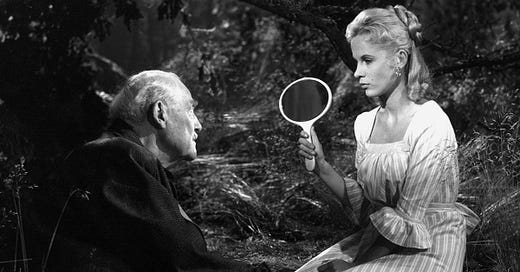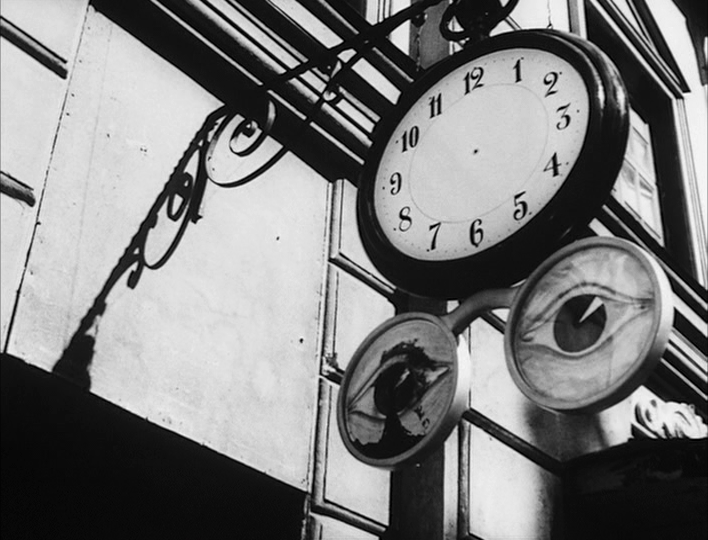Directed by Ingmar Bergman
Sweden, 1957
We watch a lot of films at ReidsonFilm. After all, that’s why we are here. Some of them are pretty good, many are entertaining, and a few, to be honest, are a bit boring but once in a while a film comes along that reels you in and leaves you watching in wonder. That’s what happened with Wild Strawberries – a quiet river of a film, but with a dark, deep, and turbulent undercurrent.
The director, Ingmar Bergman, won the Cannes Special Jury Prize in 1957 for his best-known film The Seventh Seal, a much-admired and often-parodied meditation on faith and the torment of mortality. In the same year he created another work grappling with similar themes but one that is more accessible, and perhaps more optimistic.
Ostensibly the story of a 78-year-old doctor whose journey to receive an honorary doctorate provides an opportunity to reflect on the course of a life, Wild Strawberries blends elements of a Swedish road movie, Dickens’ A Christmas Carol and surprisingly, a touch of bedroom farce.
Victor Sjöström plays the aging, anankastic Professor Isak Borg, whom we first meet meticulously lining up his pens on his desk. His wife died many years ago, and he lives alone with his housekeeper, Agda (Jullan Kindahl), with whom he shares a grudging yet enduring relationship. Initially planning to fly from Stockholm to Lund for the ceremony, Borg’s plans change after a dream wakes him at 5:00 am on the morning of his flight – one of the most unsettling evocations of a dream that I have seen on screen.
In an expressionistic throwback to the days of silent film, Borg finds himself wandering the streets of a deserted Old Stockholm when he sees a clock on the front of an oculist’s shop. The clock has no hands. A hearse approaches, and one of its wheels gets caught on a lamp post causing a coffin to spill onto the street. From the coffin, a hand reaches out and tries to pull him in. The screen cuts to black.
Borg awakens and much to the surprise and irritation of his housekeeper, he decides to make the 400-mile journey by road. The journey he embarks upon turns out to be both physical and psychological. The car is driven by his daughter-in-law, Marianne (Ingrid Thulin), who is estranged from his son, also a doctor. They don’t get off to a great start:
Marianne: You’re a selfish old man, Uncle Isak. You’re utterly ruthless and never listen to anyone but yourself. But you hide it all behind your old-world manners and charm. Beneath your benevolent exterior, you’re as hard as nails. But you can’t fool us who have seen you at close quarters. Remember when I came to you a month ago? I had a stupid idea that you might help Evald and me. So I asked to stay with you for a week or two. Remember what you answered?
Borg: I said I’d be delighted.
Marianne: Perhaps you’ve forgotten, but you said, “Don’t try to draw me into your marital squabbles. I don’t give a damn. You and Evald must make the best of it.”
That is being direct! Along the way they cross paths with a trio of young hitchhikers who act as a kind of Greek chorus, as well as figures from Borg’s past, in a melding of dreams, flashbacks, and reality. These include his wife Karin, who deceived and humiliated him, and his 96-year-old mother whose harsh and mean-spirited nature has profoundly influenced both Borg and his son Evald (Gunnar Björnstrand). Evald’s bitterness emerges in this exchange with Marianne:
Evald: It's absurd to bring children into this world and think they'll be better off than we were.
Marianne: That's just an excuse.
Evald: Call it what you want. I was an unwanted child in a hellish marriage.
These days we would give it a label, intergenerational trauma.
A pivotal moment occurs when Borg revisits the summerhouse of his youth. This is where the eponymous wild strawberries grow. An emotional anchor for his bittersweet memories they trigger a Proustian moment as dream and reality merge, and he looks on as his childhood love Sara (Bibi Andersson), leaves him for his brother, whom she eventually marries. Coincidentally, one of the hitchhikers is also named Sara (played again by Andersson), a passionate young woman, full of life, whose resemblance to Borg’s lost love is unmistakable.
Old guy reflection and regret genre - N
So, Wild Strawberries, a contemplation of aging, death and memory. But we have seen that before on screen, haven’t we? What sets Bergman’s film apart is the depth and vitality of the performances of his repertory cast, notably Thulin, Andersson and of course, Sjöström. Watching them laugh, argue, complain on that long day’s journey, there are moments reminiscent of the quiet classicism of Yasujirō Ozu, intercut with the dry, absurdist tone of Nordic film. And as Wild Strawberries draws to a close, there is indeed a lingering strain of melancholy, but also forgiveness and perhaps, reconciliation. After the award ceremony, as Borg retires to bed, his long-suffering housekeeper offers a parting gesture:
Agda: Good night Professor. I’ll leave the door ajar. You know where I am if you want anything.
Reids’ Results (out of 100)
C - 80
T - 85
N - 83
S - 88
Thank you for reading Reids on Film. If you enjoyed our review please share with a friend and do leave a comment.
Coming next… Last and First Men(2020)








![Wild Strawberries – [FILMGRAB] Wild Strawberries – [FILMGRAB]](https://substackcdn.com/image/fetch/$s_!jSRt!,w_1456,c_limit,f_auto,q_auto:good,fl_progressive:steep/https%3A%2F%2Fsubstack-post-media.s3.amazonaws.com%2Fpublic%2Fimages%2Fe728013a-77b1-491b-aa56-83bc8a0c7b92_946x720.jpeg)

This is my favorite Bergman by far